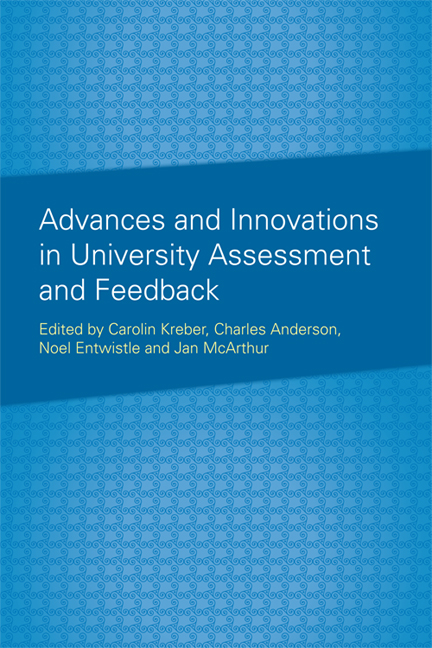Book contents
- Frontmatter
- Contents
- List of Tables and Figures
- Acknowledgements
- Foreword
- Introduction
- Part A Changing Perspectives on the Nature and Purposes of Assessment
- 1 Shifting Views of Assessment: From Secret Teachers' Business to Sustaining Learning
- 2 Flourishing amid Strangeness and Uncertainty: Exploring the Meaning of ‘Graduateness’ and its Challenges for Assessment
- 3 Assessment for Learning Environments: A Student-Centred Perspective
- Part B Students' Perceptions of Assessment and Feedback
- Part C Reconceptualising Important Facets of Assessment
- Part D Innovations in Assessment Practices
- Notes on the Contributors
- Index
1 - Shifting Views of Assessment: From Secret Teachers' Business to Sustaining Learning
from Part A - Changing Perspectives on the Nature and Purposes of Assessment
Published online by Cambridge University Press: 05 August 2016
- Frontmatter
- Contents
- List of Tables and Figures
- Acknowledgements
- Foreword
- Introduction
- Part A Changing Perspectives on the Nature and Purposes of Assessment
- 1 Shifting Views of Assessment: From Secret Teachers' Business to Sustaining Learning
- 2 Flourishing amid Strangeness and Uncertainty: Exploring the Meaning of ‘Graduateness’ and its Challenges for Assessment
- 3 Assessment for Learning Environments: A Student-Centred Perspective
- Part B Students' Perceptions of Assessment and Feedback
- Part C Reconceptualising Important Facets of Assessment
- Part D Innovations in Assessment Practices
- Notes on the Contributors
- Index
Summary
Introduction
Despite common assumptions that assessment practices in higher education are enduring, the past forty years have seen remarkable changes. A key change has been from the dominance of unseen end-of-year examinations, through the move to ‘continuous assessment’ and on to a range of diverse assessment approaches. Another notable change has been from assessment weightings being regarded as confidential to the transparency of assessment standards and criteria of today. Assessment has thus shifted in some positive directions. Unfortunately, during the same period, the emphasis on what we now call formative assessment has lessened: from a general acceptance that all courses involve the production of considerable written work that is used purely to aid learning, we now have regimes based on the assumption that all assessment must ‘count’ towards final marks or a grade point average.
My aim in this chapter is to briefly sketch these developments with the intention of projecting forward to explore emergent assessment practices. These are practices that move beyond current innovations in areas such as authentic assessment, self- and peer assessment and improved feedback to students. They represent new views of assessment based upon developing students' capacity for judgement and involve practices that emphasise an active role for students beyond the production of written work. The chapter will explore this emerging agenda and consider what changes might be possible, given the continuing dominance of accountability mechanisms that have had the effect of constraining the development of assessments for learning.
Assessment as Taken-For-Granted
One of the problems of discussing assessment is that we all have a prior or pre-existing conception of what it is and thus an immediate reaction to it, established through our early, formative experiences. Sometimes assessment has touched us deeply; sometimes it has left bruises (Falchikov and Boud 2007). While changes may occur around us, our point of reference is often what assessment was like when we were most influenced by it. This conception can easily get locked in and provide a personal yardstick against which we continue to judge assessment. It is important to resurface these prior events and experiences, as they influence what we regard as legitimate.
- Type
- Chapter
- Information
- Publisher: Edinburgh University PressPrint publication year: 2014



